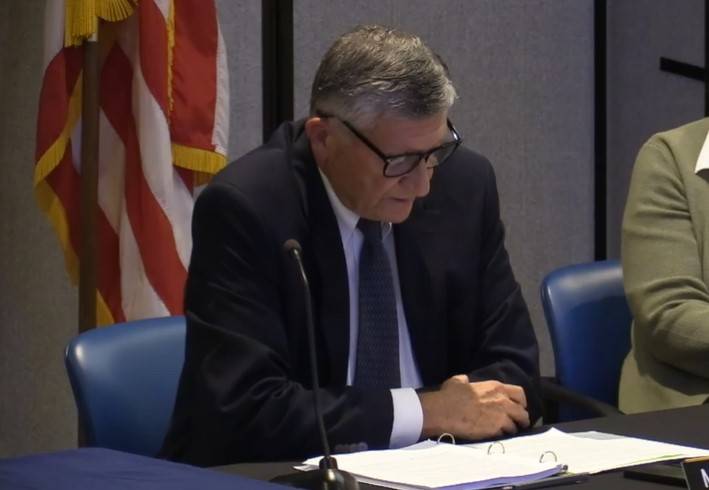Officially called “citizens petitions” on the Andover Select Board meeting agendas, the public comment section of each meeting is a chance for anyone to address the board on any town-related comment.
But Town Counsel Tom Urbelis suggested last week it may be in the select board’s best interest to do away with the public comment period following a ruling by the Massachusetts Supreme Judicial Court earlier this month. The state’s highest court ruled that the Southborough select board’s public comment policy — which reads “All remarks and dialogue in public meetings must be respectful and courteous, free of rude, personal or slanderous remarks. Inappropriate language and/or shouting will not be allowed” — violates free speech rights guaranteed in the state Constitution.
“I wanted to bring it to the attention of the board because some select boards and some city councils may decide not to have a public speak session and not have to deal with the issue,” Urbelis (photo, above) said at the March 13 Andover Select Board meeting. “Because if you don’t have a public speak session, people don’t have a right to speak.”
The Southborough case was filed by Louise Barron, who accused the board of violating the state open meeting law and of spending town funds “like drunken sailors” during the public comment period of a 2018 meeting. When Selectman Daniel J. Kolenda shut down the public comment period by moving the meeting to recess, Barron likened him to Hitler. Kolenda cited the policy when telling Barron she would be arrested if she did not leave.
“Although civility, of course, is to be encouraged, it cannot be required regarding the content of what may be said in a public comment session of a governmental meeting,” the ruling said.
If Andover or other towns were to change their policies, the board would only have to hear comment about items on the meeting’s agenda.
“The situation that existed here in Southborough wouldn’t have occurred, because it occurred during the public speak session,” Urbelis said. “If you don’t have that public speak session, this wouldn’t have happened.”
Urbelis gave an overview of the case and offered to answer questions. None of the select board members asked questions or made comments except for Alex Vispoli. “I think, obviously here, we’ll take a look at our policy on public speak sessions,” the chair said before moving the meeting on.
The select board’s current policy on public comment can be found below and on page 20 of the board’s policy guidelines:
PUBLIC COMMENT AT SELECT BOARD MEETINGS
All regular and special meetings of the Select Board shall be open to the public. Executive
sessions will be held only as prescribed by the statutes of the Commonwealth of Massachusetts.
The Board desires citizens of the Town to attend its meetings so that they may become better
acquainted with the operations and programs of the Town. In addition, the Board would like the
opportunity to hear the wishes and ideas of the public.
In order that all citizens who wish to be heard before the Board have a chance and to ensure the
ability of the Board to conduct the Town’s business in an orderly manner, the following rules
and procedures are adopted:
- At the start of each regularly scheduled Board meeting except workshops,
individuals or group representatives will be invited to address the Board. The
Chairperson shall determine the length of the public participation segment. - The presiding Chairperson may limit a speaker’s time provided the same limit
will apply to all speakers who wish to be heard on the same subject without
regard to viewpoint. - Improper conduct will not be allowed. Remarks containing obscenities, remarks
which constitute threats or fighting words, remarks which are likely to provoke a
violent reaction, and remarks which are known to be false are considered
improper and will not be allowed. If a speaker persists in improper conduct or
remarks, the Chairperson may terminate that individual’s privilege of address. - All remarks will be addressed through the Chairperson of the meeting.
- Speakers may offer such criticisms of Town operations and programs as concern
them, but in the public comment session the Board will not hear personal
complaints regarding Town personnel, except with respect to the Select Board,
Town Manager, Town Accountant, the Zoning Board of Appeals, Officers and
Registrars of Voters and Department Heads. Administrative channels are the
proper means for disposition of legitimate complaints involving Town employees. - Written comments may be presented to the Board at the meeting for the Board
members’ review and consideration at an appropriate time.

